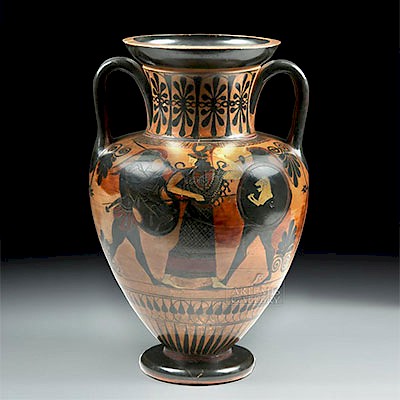Translated Greek Stone Tablet w/ Sailor Invocation
Lot 19e
About Seller
Artemis Fine Arts
686 S Taylor Ave, Ste 106
Louisville, CO 80027
United States
Selling antiquities, ancient and ethnographic art online since 1993, Artemis Gallery specializes in Classical Antiquities (Egyptian, Greek, Roman, Near Eastern), Asian, Pre-Columbian, African / Tribal / Oceanographic art. Our extensive inventory includes pottery, stone, metal, wood, glass and textil...Read more
Estimate:
$2,500 - $3,500
Absentee vs Live bid
Two ways to bid:
- Leave a max absentee bid and the platform will bid on your behalf up to your maximum bid during the live auction.
- Bid live during the auction and your bids will be submitted real-time to the auctioneer.
Bid Increments
| Price | Bid Increment |
|---|---|
| $0 | $25 |
| $300 | $50 |
| $1,000 | $100 |
| $2,000 | $250 |
| $5,000 | $500 |
| $10,000 | $1,000 |
| $20,000 | $2,500 |
| $50,000 | $5,000 |
| $100,000 | $10,000 |
| $200,000 | $20,000 |
About Auction
By Artemis Fine Arts
Oct 11, 2018
Set Reminder
2018-10-11 10:00:00
2018-10-11 10:00:00
America/New_York
Bidsquare
Bidsquare : Exceptional Antiquities | Ethnographic Art
https://www.bidsquare.com/auctions/artemis-gallery/exceptional-antiquities-ethnographic-art-3500
An important one-day auction featuring museum-worthy examples of classical antiquities, ancient and ethnographic art from cultures encompassing the globe. Artemis Fine Arts info@artemisfinearts.com
An important one-day auction featuring museum-worthy examples of classical antiquities, ancient and ethnographic art from cultures encompassing the globe. Artemis Fine Arts info@artemisfinearts.com
- Lot Description
Ancient Greece, Island of Crete, ca. 6th to 5th century BCE. An oblong stone tablet with four lines of inscribed text meant as a protective invocation for sailors or mariners. The tablet has flat lateral sides, rounded top and bottom peripheries, a relatively flat obverse face, and a slightly convex verso. When translated, the text reads, "Heracles, who lives (or 'camps') in our city, come (or 'have pity') and may you preserve them for the rest of time, and you also, white goddess, Cretan-born, arrow-pourer, save [them] together with their wives." Though some of the letters at the ends of each line are faded, the inscription can still be made out with relative accuracy. Custom museum-quality display stand included. Size: 8.5" W x 5.125" H (21.6 cm x 13 cm); 6.25" H (15.9 cm) on included custom stand.
This tablet is an interesting example of how sailors, fishermen, and workers of the sea prayed for their needs of protection while on the vast, open Mediterranean waters. The four named deities - Heracles and the epithets white goddess, Cretan-born, and arrow-pourer - all hold some significance in defending sailors and their well-being. First, Heracles would have been prayed to as his feats of strength meant he could withstand even the strongest and most terrifying natural forces. Second is Leukothea (literally "white goddess"), a goddess of the sea and a noted protectress of sailors who aided those seafarers in distress. Third is Zeus of Crete ("Cretan-born"), the primary god of the Greek Pantheon and god of thunder and the sky; sailors pleaded to him for fair weather, calm skies, and placid waters. Last is Artemis ("arrow-pourer"), the goddess of the hunt typically prayed to by hunters or soldiers; she was prayed to divert any contentious or otherwise threatening vessels from the sailors' path.
A few intricacies regarding the inscribed text make this an intriguing example. First is the particularly powerful line "for the rest of time" which, when literally translated, means "for the whole time" or "for all of time." This statement indicates this inscribed invocation was not meant as a one-time appeal for protection; it was intended as an ever-lasting prayer for current sailors and all similar mariners to come. Second is how there does not seem to be any delineation between individual deities when addressing Leukothea, Zeus, and Artemis. This could possibly be due to a grammatical mistake on the part of the inscriber, or there could be a deeper, regionally-specific explanation. On the surface, the three deities seem to represent the protection against the specific maladies which could plague or ultimately terminate the voyages of seafarers. Though when prayed to in a conjunctive manner, a sailor might expect that certain protective aspects of each deity might overlap and provide them with a more all-encompassing aegis of preservation.
Provenance: private East Coast, USA collection
All items legal to buy/sell under U.S. Statute covering cultural patrimony Code 2600, CHAPTER 14, and are guaranteed to be as described or your money back.
A Certificate of Authenticity will accompany all winning bids.
We ship worldwide and handle all shipping in-house for your convenience.
#136992Surface wear and abrasions commensurate with age, fading to some inscribed letters, minor nicks along obverse, reverse, and peripheries, and light roughness across most surfaces, otherwise intact and excellent. Light earthen deposits throughout. Inscribed Greek text is still legible.Condition
- Shipping Info
-
All shipping is handled in-house for your convenience. Your invoice from Artemis Gallery will include shipping calculation instructions. If in doubt, please inquire BEFORE bidding for estimated shipping costs for individual items.
-
- Buyer's Premium



 EUR
EUR CAD
CAD AUD
AUD GBP
GBP MXN
MXN HKD
HKD CNY
CNY MYR
MYR SEK
SEK SGD
SGD CHF
CHF THB
THB














